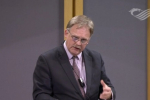
The Welsh Government has this afternoon been criticised for its slow progress in addressing barriers to the successful Implementation of the Well-Being of Future Generations (Wales) Act 2015.
Speaking as Chair of the Public Accounts and Public Administration Committee in the joint Public Accounts and Public Administration Committee and Equality and Social Justice Committee debate: ‘Well-being of Future of Generations Act 2015: Scrutiny of implementation’, Mr Isherwood highlighted failings in successful implementation of the Act, which became law six years ago, and said although the Welsh Government has committed to addressing the barriers preventing the Act from achieving what it set out to do, progress is too slow.
Speaking in the Senedd, he said:
“This aspirational, flagship legislation cuts across all we do here in Wales to ensure our public services deliver efficiently and sustainably for our future generations.
“Several months ago, my predecessor stood in this Siambr and spoke about the findings of the then, Public Accounts Committee’s report on ‘Delivering for Future Generations: The Story so Far’. The report found that inconsistent leadership and slow culture change were failing the aspirations of the Act, since it became law, six years ago, in 2015.
“It was the first time that a Senedd Committee had conducted comprehensive scrutiny of implementation of the Act, with 97 organisations contributing to the inquiry. It was complex work that focussed on looking at the bigger picture and what barriers to implementation were common to most, if not all, public services. It took a broad view on the fundamental problems lying behind everyone’s efforts to implement the Act.
“Our predecessor committee’s report made 14 recommendations, mainly aimed at the Welsh Government.
“The Welsh Government has now published its responses to all three reports looking at the Act and today we have the opportunity to debate these fully.
“However, this has only been brought about by the proactive and pragmatic approach taken jointly by myself and the Chair of the Equalities and Social Justice Committee, in requesting this joint debate. I hope this signifies and sends out a clear message about the seriousness with which Senedd Committees approach their scrutiny and discharge our duties of holding the Welsh Government to account.”
Mr Isherwood added:
“Implementation of the Act depends on cultural change which needs to begin with awareness and understanding at all levels of public bodies. Time and again we have heard that not enough has been done to achieve this and bring about the shift to sustainable development across public services that the Act aims to deliver.
“Although public bodies have had adequate time and opportunity to take those vital first steps towards embedding sustainable development in all public services, we are simply not seeing words translate into tangible action and it is still not clear what difference the Act has made to the way public bodies operate.
“More work is needed to support public bodies charged with implementing the Act, to understand not only the seven well-being goals, but also the five ways of working set out in the Act. Without this shift in cultural change we cannot overcome the barriers to implementing this Act.”
Summing up, Mr Isherwood said:
“It is clear implementation of the Act is being restrained by far too many barriers. The Welsh Government has committed to addressing these but progress remains too slow.
“There is no clear pathway to addressing these barriers and we stress that implementation of all legislation requires monitoring, evaluation and a clear timetable for action. The Welsh Government needs to take the lead by setting a clear direction of travel to enable us, as a Senedd, and Wales, as a country, to take collective responsibility for reshaping public services for the better.”
